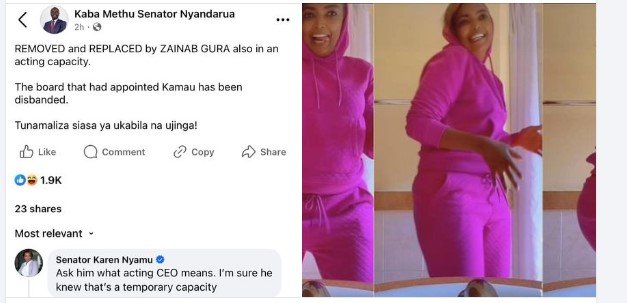“Nitakuita watu wakianza kutwerk!!” sparked online discussions when it was uttered by Nyandarua Senator Kaba Methu during a verbal exchange with Nairobi-based politician Karen Nyamu. This statement, which loosely translates to “I’ll call you when people start twerking!” encapsulated the tension between the two politicians during a Senate session. It also highlighted a moment of humor and controversy that brought public attention to their differing approaches to leadership and political debates.
Kaba Methu’s remark was perceived as a sharp jab at Karen Nyamu’s outspoken nature and her reputation for being a vibrant, sometimes polarizing, figure in Kenyan politics. Nyamu, known for her candid personality and active presence both in political circles and on social media, often finds herself at the center of public discourse. This specific exchange, however, revealed deeper undercurrents of political rivalry and differing priorities among lawmakers.
While some applauded Methu for his wit, others criticized the remark, viewing it as dismissive and undermining Nyamu’s credibility. For her part, Nyamu remained unfazed, brushing off the comment and continuing to assert her views unapologetically. The back-and-forth illustrated the dynamic interplay of personalities within Kenya’s political landscape, where charisma and public perception often weigh as heavily as policy discussions.
Beyond the humor and headline-worthy moments, the incident also sparked conversations about the decorum expected in political spaces. It brought into focus the balance between levity and professionalism in legislative settings. Many questioned whether such exchanges detract from the substantive issues facing the nation, while others argued that they reflect the human side of politics, making leaders more relatable to the public.
Ultimately, the exchange between Senator Kaba Methu and Karen Nyamu provided a snapshot of the vibrant, sometimes chaotic, world of Kenyan politics. It served as a reminder that political debates often extend beyond policy disagreements to include moments of levity, personality clashes, and the occasional viral quip. Whether viewed as a lighthearted exchange or a distraction from serious discourse, the incident underscored the power of words in shaping public opinion and defining political legacies.



